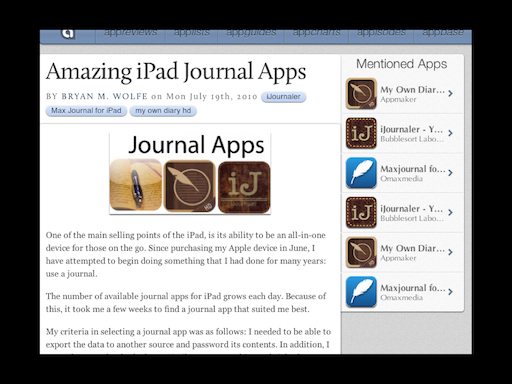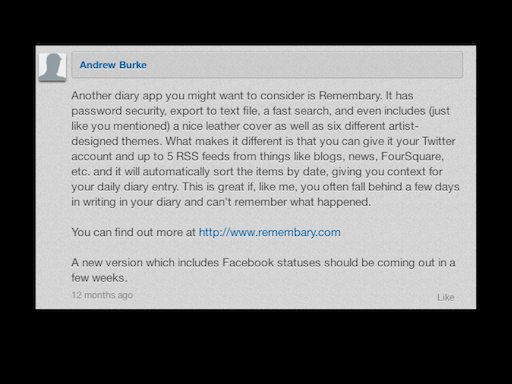My Year of "Hits" Part 1: Remembary Rises (and Stumbles)
Feb 04, 2014 01:25

This is a transcript and slides of my PodCamp Halifax 2012 presentation. 2011 was a pretty eventful year for me, and this talk covered some of the lessons I learned. Even if they’re long overdue, I think the stories are still worth telling. I didn’t have presenter notes - I just talked off of the slides - so I’ve had to remember or at least reconstruct what I said. If anybody was there and remembers things differently, please let me know!
2011 was a big year for me. I had created my first real “product”, an iOS diary app called "Remembary", in late 2010, and through an unlikely series of events it finally got some traction in early 2011. Also, halfway through the year I started a site called "starshipsstarthere.ca" which managed to go viral later in the year. In both of these cases I learned a lot about products, promotion, and how the internet works.
So for this talk, I’ll (1) tell some hopefully fun stories, (2) show some real-world numbers for moderate success in the App Store, and (3) share some random tips and advice from my experiences.
Remembary
Almost exactly a year ago, I gave a talk at PodCamp 2011 about the things I had learned in building and promoting my iOS app Remembary. While I enjoyed talking about my experiences, the talk couldn’t help but be a little bit sad. Remembary hadn’t seen a lot of sales, and hadn’t received much attention.
At the end of December 2010, I had made a big push in Google AdWords and Facebook Ads, in the end spending several thousand dollars on them. The peak of this spending was in the week between Christmas and New Year’s, since I figured a lot of people would be getting iPads under the tree, and many people start writing diaries in the New Year. The peak of my spending, several hundred dollars a day for several days, was right around New Year’s. Here you can see the results:

As you can see, in my highest period of spending, I sold nothing at all.
This set the somewhat sad background mood for my talk and some related blog posts.
But I still found the app itself useful, and I managed to end the talk ended in an upbeat note. I stopped doing AdWords, but didn't stop thinking about the app and figuring out how to promote it.
Remembary Rises
Then something funny happened. Through some Google searching, I discovered an article in the top app review site AppAdvice: "Amazing iPad Journal Apps".

This article had come out before Remembary, but the author complained about a number of things that these diaries were missing but that Remembary actually had. So I decided to add a comment at the bottom, talking about Remembary.

Later that day I got an email from the author of the article asking for a promo code. So I sent him one and then went back to work on a client project. I went for some after-work drinks and didn't check my email for several hours. When I did finally check on my phone, I discovered a surprising number of emails arriving about Remembary.
I rushed home to figure out why the sudden interest, and discovered this:

AppAdvice is one of the most influential app review sites out there, and Remembary had just scored a rave review. App Store sales figures only come out once a day, so I had a sleepless night waiting for the numbers to arrive. I had no idea what to expect. Would I wake up a rich man? Well, not exactly, but it was certainly an improvement:

In fact Remembary made more money in the two days after that article was posted than in its entire previous lifetime.
So, there were two big lessons I learned from this experience:
Lesson: A Good Review In AppAdvice Can Really Help
The app had received small notices in less significant sites, and I had done a lot of my own social media promotion, and of course spent a lot of money on AdWords, but one strong review changed the entire fortunes of the app.
Lesson: Comments Are Content Too
But that review wouldn't have happened if I hadn't added that comment to the article. I'm a big believer in "don't read the comments" but clearly they can have an impact if targeted properly. I continued to get traffic to the remembary.com website from that comment for months and months after I posted it. It's right underneath the main content of the article, which makes it practically a continuation of it.
But a few days later, I learned another lesson - a really important lesson that I've seen repeated over and over again.
If you look at the sales results I posted above, you can see the days before the article I sold 2 copies, then 1 copy, then 2 again. The review triggered a big spike with about 120 sales a day for two days.
But then the sales went right back down to the single digits.
Lesson: Fame is Fleeting, Especially on the Internet
The internet is famous for the speed of its "virality", spreading fame (and traffic and sales) almost instantly. The flip side of this is that all of this attention goes away almost as quickly. If you're doing things online, you should be aware of this. This effect is of course true in the "real world" as well, but it's somewhat slower.
One other thing to keep in mind, though: even if a fame spike only lasts a day or two, usually the new baseline of attention is a bit higher than it was before. You'll notice in the table above that while the sales went back down, they were well above the 0 to 1 a day from before.
Remembary Stumbles
I had been clued in to the rave review by the large number of support emails that were filling my inbox. It turns out that this is because the suddenly larger user base had discovered a bug in the app. It was the worst kind of bug for a diary app, one that deleted people's diary entries. But it wasn't a bug that I could reproduce. It was a nightmare!
I've already written a lot about this situation, so instead of repeating it all here, I'll just include a link to the blog post that covers everything.
Indie App Crisis PR
In the previous months, I had learned a lot about building and promoting an app - and now I had a crash course in Crisis PR. One of my earliest clients back when I started tech consulting had been a Crisis PR consultancy, and I tried to remember as much as possible from the various Word docs and PowerPoint presentations I had done for them.
I wrote several blog posts about this too, but the main theme is that while your instinct may be to deny things and run away, it's best to face problems head-on and admit them up front. People are used to complaining to aggressively faceless corporations, and often warm up once they realize they're actually dealing with a human being - especially one who responds quickly and honestly.
Lesson: Don't run from blame. Face up to problems, apologize, and work to be better.
Lesson: Replying honestly to people who complain to you can turn them into strong supporters.
My biggest problem, though, was complaints on the App Store. App Store reviews have a big impact on sales and whether Apple will consider your app to be featured, but they're also a favourite place for people to complain about your app. Unfortunately, there's no way to respond to people on the app store, and no other way to contact them. One trick I did figure out, though: many people will use the same nickname in multiple places, so it's worth checking for their App Store name in Twitter, or even doing a Google search for it. It's surprising how many people can be found that way - although it's a good idea to be very careful in your wording when contacting them so they don't freak out.
Lesson: App Store reviewers often have the same name on Twitter
Continue to Part 2 to see what happened after Remembary got back on its feet, and what it's like to be a big deal in Malta.